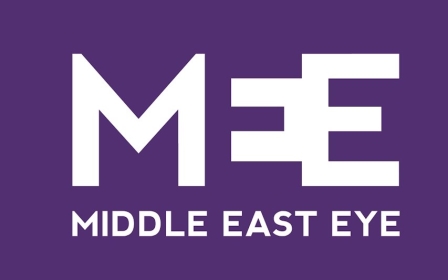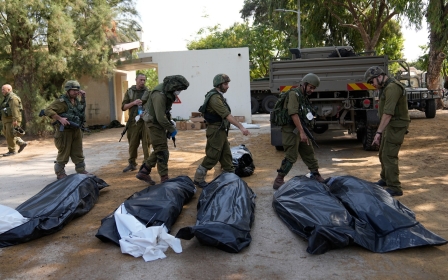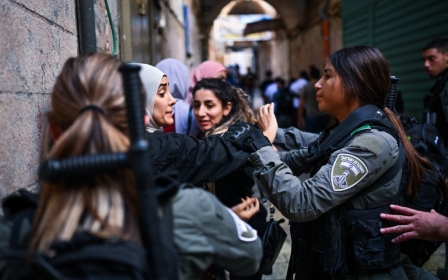Israel-Palestine war: What war crimes may have already been committed?
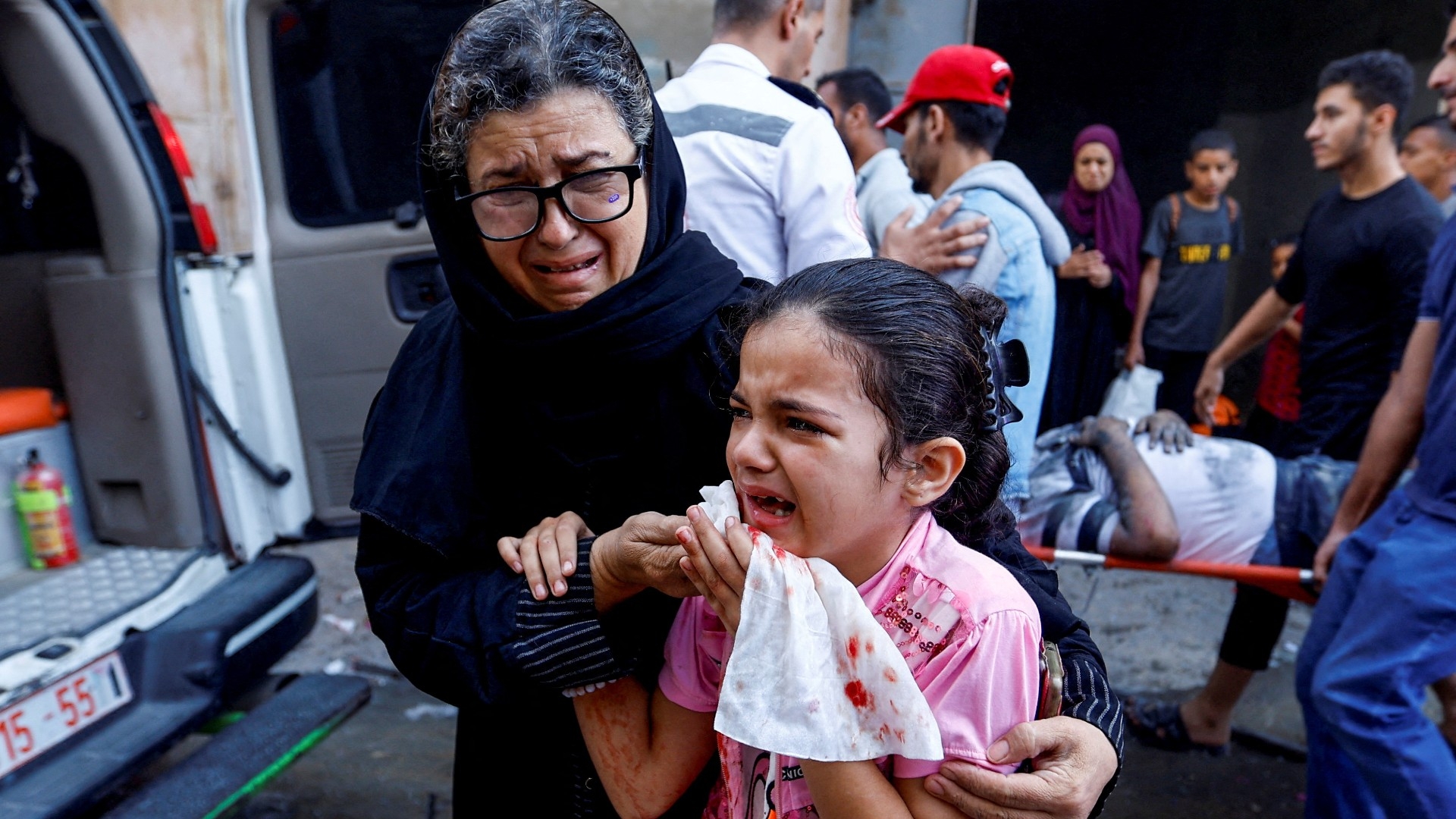
There is already clear evidence that war crimes have been committed over the past week in Israel and the Gaza Strip, legal experts and human rights groups have said.
On Thursday, the top prosecutor at the International Criminal Court (ICC) confirmed that it has jurisdiction over any war crimes carried out by Israelis or Palestinian fighters.
So what crimes may have already been committed and what prospects are there for accountability?
Starting with last Saturday's surprise attack, which killed around 1,600 Israelis, the Palestinian fighters' apparent deliberate targeting of civilians, indiscriminate attacks and taking of civilian hostages amount to war crimes, Human Rights Watch has said.
They may even constitute crimes against humanity "given the attacks' widespread nature and systematicity", wrote Tom Dannenbaum, associate professor of international law at Tufts University's Fletcher School.
New MEE newsletter: Jerusalem Dispatch
Sign up to get the latest insights and analysis on Israel-Palestine, alongside Turkey Unpacked and other MEE newsletters
While war crimes are acts carried out only in times of armed conflict and usually individual instances of violations, crimes against humanity are defined as deliberate acts carried out systematically that cause human suffering or death on a widespread scale.
Forty-eight hours after the Hamas-led Palestinian attack, Israeli Defence Minister Yoav Gallant announced "a complete siege on Gaza".
"No electricity, no food, no water, no gas. It's all closed. We are fighting animals and we are acting accordingly," he said.
His comments sparked outrage, with observers noting that Gaza has already been unlawfully blockaded for the past 16 years.
But his words were also unpicked by legal experts who say it points to intentional actions and policies that would be illegal, with language that one said was "genocidal".
Follow Middle East Eye's live coverage for the latest on the Israel-Palestine war
"The intentional starvation of civilians, the intentional thirst of civilians, the intentional damage to civilian infrastructure, are war crimes," Israeli human rights lawyer Michael Sfard posted on X, formerly known as Twitter.
"Gallant seems to suggest them as war methods. There is no context in which such a policy can be legal."
Israel has said water and fuel will not be restored until Hamas returns Israeli hostages taken last Saturday. Hamas and the Palestinian Islamic Jihad say they took around 130 captives to Gaza.
Kristyan Benedict, crisis response manager for Amnesty International UK, told Middle East Eye: "The collective punishment of a civilian population is a war crime, as is using starvation of civilians as a weapon of war.
"Placing further restrictions on Gaza's access to essential services is tantamount to a death sentence for many residents, cutting them off from water, food, and medicine."
Bombs, white phosphorous, 'aiding and abetting'
Israel's bombardment of Gaza this week, which has seen more than 6,000 bombs hit 3,600 targets including schools, hospitals and the Rafah border crossing among many other sites in densely populated areas, may also constitute a war crime.
"Indiscriminately killing civilians in the context of hostilities, with no regard for the principles of distinction, precaution and proportionality, is a war crime," 50 UN experts said on Friday.
The experts and rights groups have also noted as a potential war crime the barrage of indiscriminate rocket fire launched from Gaza both during the Palestinian offensive and since, thousands of which have landed in central and southern Israel, and even reached as far as Haifa and Safad in Israel's north.
Israel's alleged use of white phosphorus in military operations in Gaza and Lebanon, which HRW has said put civilians at risk of serious and long-term injuries, may also be a war crime.
White phosphorous is not always prohibited by international humanitarian law, but using it is a war crime when it is used to target civilians or used indiscriminately, said Mark Kersten, assistant professor of criminal justice and criminology at Canada's University of Fraser Valley.
Kersten told MEE: "The thing we should be looking out for, which is the same thing that happened in Gaza in 2009, is whether Israeli forces are using it in a way where it is put up into the air, exploded and then rains down on areas where there are primarily civilians living."
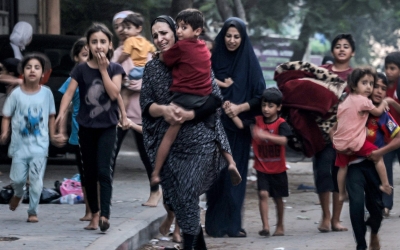
Now, with Israel's call on Friday for 1.1 million Palestinians in northern Gaza to flee south, some say the country may be on the verge of further potential crimes.
Jan Egeland, secretary general of the Norwegian Refugee Council, said "absent of any guarantees or safety or return", the Israeli demand would amount to the war crime of forcible transfer. "It must be reversed," he said.
Tayab Ali, director of the International Centre of Justice for Palestinians (ICJP), told Good Morning Scotland: "One million people are being told to leave or die from what is effectively an open-air prison camp.
"There has never been a clearer sign that not only is Israel prepared to commit war crimes, it is about to commit a crime against humanity."
On Saturday, the ICJP said it had written to UK government officials that it intends to prosecute them for "aiding and abetting war crimes in Gaza", which Ali said is itself a war crime.
"It's a war crime to aid, abet or otherwise assist a war crime," Ali told MEE. "This applies to politicians that unequivocally encouraged and supported the response from Israel."
He added: "Politicians were warned to urge Israel restraint. Instead, many urged unequivocal support for Israel without conditions, and some governments have sent military aid to the region. These acts should be immediately investigated by Scotland Yard and the ICC."
Eyes on the ICC
Given the mounting evidence of crimes, observers are calling on the ICC - the only court that will hear many of the types of atrocities that are alleged - to bring accountability.
Earlier this week, the prosecutor's office at the ICC confirmed that "crimes committed in the current context" would be part of an investigation opened in 2021 into war crimes and crimes against humanity in the occupied Palestinian territories since 2014.
The investigation, rejected by Israel and the US, has been criticised for the slow pace at which it has moved.
Amnesty's Benedict urged the UK and other states to lend their "unconditional and unequivocal support" to the court's work. "The ICC investigation is moving too slowly and must progress rapidly to help create a deterrent effect," he said.
"Every hour, day, week and year that it does not [move forward], saps its credibility and raises the question what more evidence could it possibly need," Kersten said.
On Thursday, Karim Khan, the ICC prosecutor, commented for the first time about the violence of the past week.
"It's horrendous what's going on, what we're seeing on our television screens. There has to be a legal process to determine criminal responsibility," Khan told Reuters.
Khan also said that the ICC has jurisdiction over potential war crimes committed over the past week even though Israel is not a member to the court.
While the ICC is now the best legal hope for those seeking accountability, some experts said that for the Palestinians, who acceded to the ICC in 2015, there is concern that politics will stymie the court's work.
"History has shown that the Palestinians can expect very little from the international courts, from international law and from the international community of states," Penny Green, a law professor and director of the International State Crime Initiative at Queen Mary University of London, told MEE.
"They are not going to get justice through laws or courts, I'm afraid."
This article is available in French on Middle East Eye French edition.
Middle East Eye delivers independent and unrivalled coverage and analysis of the Middle East, North Africa and beyond. To learn more about republishing this content and the associated fees, please fill out this form. More about MEE can be found here.


